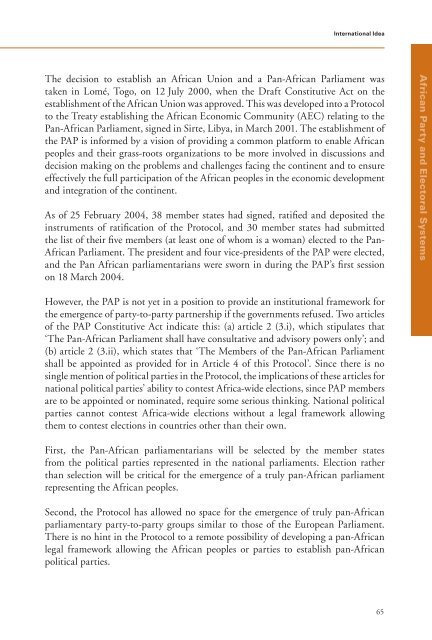Political Parties in Africa: Challenges for Sustained Multiparty
Political Parties in Africa: Challenges for Sustained Multiparty
Political Parties in Africa: Challenges for Sustained Multiparty
Create successful ePaper yourself
Turn your PDF publications into a flip-book with our unique Google optimized e-Paper software.
International Idea<br />
The decision to establish an <strong>Africa</strong>n Union and a Pan-<strong>Africa</strong>n Parliament was<br />
taken <strong>in</strong> Lomé, Togo, on 12 July 2000, when the Draft Constitutive Act on the<br />
establishment of the <strong>Africa</strong>n Union was approved. This was developed <strong>in</strong>to a Protocol<br />
to the Treaty establish<strong>in</strong>g the <strong>Africa</strong>n Economic Community (AEC) relat<strong>in</strong>g to the<br />
Pan-<strong>Africa</strong>n Parliament, signed <strong>in</strong> Sirte, Libya, <strong>in</strong> March 2001. The establishment of<br />
the PAP is <strong>in</strong><strong>for</strong>med by a vision of provid<strong>in</strong>g a common plat<strong>for</strong>m to enable <strong>Africa</strong>n<br />
peoples and their grass-roots organizations to be more <strong>in</strong>volved <strong>in</strong> discussions and<br />
decision mak<strong>in</strong>g on the problems and challenges fac<strong>in</strong>g the cont<strong>in</strong>ent and to ensure<br />
effectively the full participation of the <strong>Africa</strong>n peoples <strong>in</strong> the economic development<br />
and <strong>in</strong>tegration of the cont<strong>in</strong>ent.<br />
As of 25 February 2004, 38 member states had signed, ratified and deposited the<br />
<strong>in</strong>struments of ratification of the Protocol, and 30 member states had submitted<br />
the list of their five members (at least one of whom is a woman) elected to the Pan-<br />
<strong>Africa</strong>n Parliament. The president and four vice-presidents of the PAP were elected,<br />
and the Pan <strong>Africa</strong>n parliamentarians were sworn <strong>in</strong> dur<strong>in</strong>g the PAP’s first session<br />
on 18 March 2004.<br />
However, the PAP is not yet <strong>in</strong> a position to provide an <strong>in</strong>stitutional framework <strong>for</strong><br />
the emergence of party-to-party partnership if the governments refused. Two articles<br />
of the PAP Constitutive Act <strong>in</strong>dicate this: (a) article 2 (3.i), which stipulates that<br />
‘The Pan-<strong>Africa</strong>n Parliament shall have consultative and advisory powers only’; and<br />
(b) article 2 (3.ii), which states that ‘The Members of the Pan-<strong>Africa</strong>n Parliament<br />
shall be appo<strong>in</strong>ted as provided <strong>for</strong> <strong>in</strong> Article 4 of this Protocol’. S<strong>in</strong>ce there is no<br />
s<strong>in</strong>gle mention of political parties <strong>in</strong> the Protocol, the implications of these articles <strong>for</strong><br />
national political parties’ ability to contest <strong>Africa</strong>-wide elections, s<strong>in</strong>ce PAP members<br />
are to be appo<strong>in</strong>ted or nom<strong>in</strong>ated, require some serious th<strong>in</strong>k<strong>in</strong>g. National political<br />
parties cannot contest <strong>Africa</strong>-wide elections without a legal framework allow<strong>in</strong>g<br />
them to contest elections <strong>in</strong> countries other than their own.<br />
First, the Pan-<strong>Africa</strong>n parliamentarians will be selected by the member states<br />
from the political parties represented <strong>in</strong> the national parliaments. Election rather<br />
than selection will be critical <strong>for</strong> the emergence of a truly pan-<strong>Africa</strong>n parliament<br />
represent<strong>in</strong>g the <strong>Africa</strong>n peoples.<br />
Second, the Protocol has allowed no space <strong>for</strong> the emergence of truly pan-<strong>Africa</strong>n<br />
parliamentary party-to-party groups similar to those of the European Parliament.<br />
There is no h<strong>in</strong>t <strong>in</strong> the Protocol to a remote possibility of develop<strong>in</strong>g a pan-<strong>Africa</strong>n<br />
legal framework allow<strong>in</strong>g the <strong>Africa</strong>n peoples or parties to establish pan-<strong>Africa</strong>n<br />
political parties.<br />
<strong>Africa</strong>n Party and Electoral Systems
















